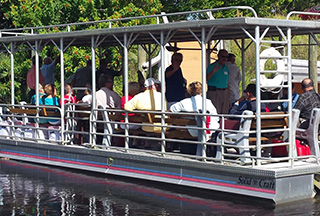An online phenomenon that has upended the taxi and limousine industry in big cities is hitting the water, so fast that the Coast Guard in Florida dedicated some Labor Day weekend patrols to looking for unlicensed and illegal for-hire boat operators who get their customers from the Internet.
They are calling it “Uber for boats,” smartphone ride-sharing applications that connect tourists who want a cheap and convenient boat trip with private vessel owners. The services are proliferating in recent months, but officials at the Coast Guard Seventh District headquarters in Miami suspect most of the operators don’t even have the bare requirements to legally carry passengers.
“We had heard through the grapevine that there were applications out there to pair people up with boat owners,” said Cmdr. Michael Capelli of the Coast Guard Seventh District prevention, inspection and investigations office.
To legally carry paying riders, those operators need to be at least licensed to carry up to six passengers – the so-called “six pack” certification for small charter fishing and tour boat operators. “If he’s carrying seven or more, that vessel needs to be inspected,” Capelli said.
“We love seeing more people getting involved in for-hire. But if they do it illegally, the penalties are pretty serious,” Capelli said. Unlicensed operators may be liable for civil fines up to $35,000, he said.
Uber the car service company has made its own forays into maritime service, from a two-week trial in Boston during summer 2014, and in Istanbul, Turkey, where a new water taxi across the Bosporus offers commuters an escape past that city’s huge traffic jams.
In Florida, the hotspots for ride-sharing this summer appear to be south Florida and the St. Petersburg-Tampa Bay area on the state’s Gulf of Mexico coast, Coast Guard officers said. “This is where we’re trying to educate the boat owners” and public with public service advertisements and radio spots, said Marilyn Fajardo, a spokeswoman for the Seventh District office.
The message is “Ask the Captain” so visitors know if they are getting a licensed and permitted operator and vessel when they step aboard a boat.
It’s not surprising that Florida would birth a marine version of Uber, Lyft and other private car services offered online, with its more than 900,000 registered boats and a thriving year-round tourist trade.
Private boat owners who enter into casual commercial deals expose themselves to fines for being unlicensed.
“Random drug testing is required for captains and crews too. For vessels 5 tons and more, they need documentation. They could be in violation of those regulations as well,” Capelli said.
There have not been any known casualties yet associated with a ride-share boat, but the Coast Guard has its sector and field station operators out looking for illegal operations – and checking in with legal passenger and charter operators.
“The industry does a really good job of policing itself,” said Lt. Cmdr. Tim Tilghman of the Seventh District inspections office. On a national scale, the Coast Guard is talking to the Small Passenger Vessel Association to keep an eye out for unlicensed operators.





